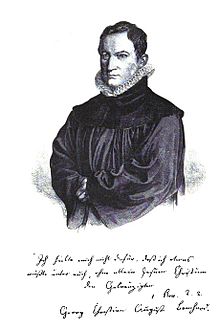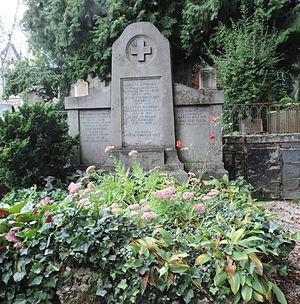August Bomhard
Georg Christian August Bomhard (born November 7, 1787 in Schmalfelden , † July 23, 1869 in Augsburg ) was pastor of St. Jakob and dean in Augsburg, as well as church councilor and honorary doctor of the University of Erlangen . He was one of the most powerful preachers of his time and a representative of Erlangen theology , which turned against rationalism.
Life
Bomhard was born the son of a pastor and from 1802 attended high school in Ansbach , in order to start studying theology in Erlangen at the age of 17 after completing his high school diploma. After his ordination in Nuremberg , he took up his first pastor in Laubenzedel in 1815 .
His reputation as a fascinating preacher soon preceded him, which is why he was appointed pastor at St. Jakob in Augsburg by the Bavarian king in 1824 . His impressive sermons brought "people of all ages and classes from all parts of the city" (Sperl) to the Jakobskirche.
In 1829 Bomhard refused a transfer to the senior consistory in Munich and thus the post of royal court preacher. In 1840 he was appointed dean and also influenced Augsburg's education system; He also took part in general synods of the Evangelical Lutheran Church in Bavaria as a member of parliament.
In 1849 he was made an honorary doctorate from the University of Erlangen and awarded by the Bavarian king; among other things he received the title of a church councilor.
In 1866 Bomhard had to resign from office due to health issues; he died on July 23, 1869 in Augsburg.
Act
Bomhard was an ardent advocate of traditional Protestantism and with his sermons fought vehemently against the rationalistic tendencies that were also emerging in the church . In his early days as a pastor he was often placed in the corner of the “mystics” and “dark men”, “who were not suitable for an enlightened city population and were only allowed to do their strange things with the farmers outside” (Sperl).
That this was not the case was shown by his every Sunday audience in Augsburg, which grew steadily and even competed with the Catholic church services in the area. Bomhard and his like-minded people feared that rationalism would deplete their faith. Bomhard published a collection of his sermons and was heavily involved in the homiletic-liturgical correspondence sheet .
Similar to Luther , Bomhard spoke the language of the common people and in his sermons, which were always recited by heart, used powerful and spirited symbols and comparisons, through which he also knew how to captivate the Protestant city patriciate.
family
Bomhard was married twice: in 1824 he married Jeanette Braun (1789–1839), after her death in 1841 Felizitas Freiin von Tröltsch (1808–1861) from the Augsburg patriciate. The first as well as the second marriage had five children.
His grandson August Sperl wrote a comprehensive biography of Bomhard.
The family grave of the Bomhards is located in the Protestant cemetery in Augsburg .
literature
- August Sperl: D. Georg Christian August Bomhard. Munich 1890.
- Parish Office St. Jakob Augsburg (Ed.): St. Jakob 650 years. A church and its part of town. Augsburg 2005.
Individual evidence
- ↑ Manfi.B.
| personal data | |
|---|---|
| SURNAME | Bomhard, August |
| ALTERNATIVE NAMES | Bomhard, Georg Christian August |
| BRIEF DESCRIPTION | German Protestant theologian |
| DATE OF BIRTH | November 7, 1787 |
| PLACE OF BIRTH | Schmalfelden |
| DATE OF DEATH | July 23, 1869 |
| Place of death | augsburg |

